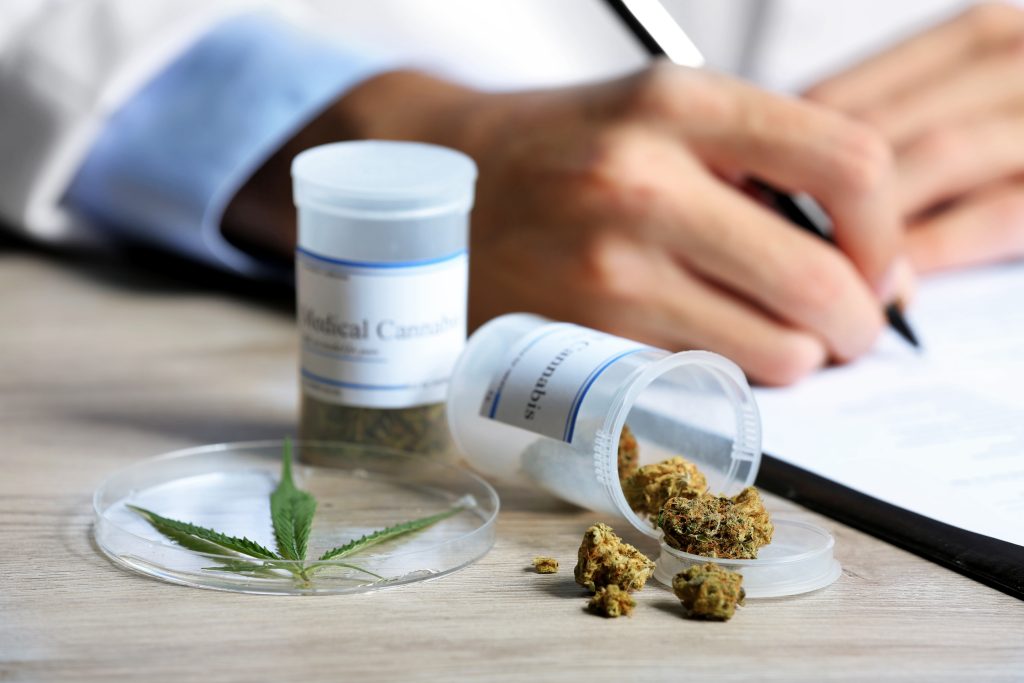Every year on December 3, we come together to recognize the International Day of Persons with Disabilities — a day to raise awareness, honor resilience, and celebrate inclusion. For millions of people living with disabilities, everyday life can bring challenges like chronic pain, anxiety, or mobility issues. While traditional medications help many, they don’t always work for everyone — and sometimes bring side effects that make things harder.
That’s where cannabis is starting to come into the conversation. As a natural and increasingly researched option, it’s offering new hope for those looking for relief and support. In this blog, we’ll take a closer look at how cannabis might help people with disabilities feel more comfortable, more empowered, and more in control of their daily lives.
Exploring Cannabis for Disabilities
Understanding Cannabis: What Makes It So Helpful?
Cannabis isn’t just about recreation — for many, it’s part of a journey toward feeling better and living more comfortably. People have been using it for centuries to ease pain, calm the mind, and support overall well-being.
So what makes it potentially helpful for people with disabilities? It all comes down to something called cannabinoids — natural compounds in the plant that work with our body’s own endocannabinoid system (ECS). This system helps keep things like mood, pain, appetite, and sleep in balance — all things that can become extra challenging when living with a disability.
What’s Inside Cannabis That Makes It Work? Meet THC and CBD
Cannabis helps many people feel better, and that’s thanks to two main compounds: THC and CBD. Each one offers its own kind of support, and together, they can make a real difference.
THC (Tetrahydrocannabinol)
This is the part of the plant that can make you feel “high.” But it’s more than just that — THC is known for helping with pain relief, muscle tightness or spasms, and boosting appetite. For some, especially those dealing with physical discomfort, it can bring real relief.
CBD (Cannabidiol)
Unlike THC, CBD won’t make you feel high. Instead, it’s known for its calming, therapeutic effects. Many people turn to CBD for help with anxiety, inflammation, or seizures, and it’s often used to promote a sense of balance and ease.
The best part? THC and CBD can work together to provide more complete, gentle relief. At Empire 420, you’ll find a range of products with different blends of both — so whether you’re looking to unwind, manage pain, or simply feel more in control, there’s likely something that fits your needs.
Living with Chronic Pain and Muscle Spasms: A Daily Reality for Many
For many people living with disabilities, chronic pain is more than just a symptom — it’s a part of everyday life. Conditions like arthritis, multiple sclerosis (MS), or spinal cord injuries often bring pain that doesn’t go away. And over time, that pain can make even simple things — walking, sleeping, or just getting through the day — feel exhausting.
It’s not just about physical discomfort either. Living with constant pain can take a toll on your mental and emotional well-being, too. That’s why finding relief that truly helps matters so much — not just to feel better, but to live better.
How Cannabis Can Bring Relief from Pain and Muscle Spasms
For many people living with chronic pain or muscle spasms, finding effective relief can feel like a constant struggle. Cannabis is becoming a natural option that offers real hope — thanks to its ability to reduce inflammation and ease pain.
THC, the part of cannabis that can make you feel “high,” has actually been used for pain relief for centuries. What’s exciting is that science is now showing how THC works with our body’s own endocannabinoid system — a system that helps control pain and inflammation. By connecting with certain receptors in the brain and nervous system, THC can help dial down the sensation of pain and relax muscle spasms, making daily life a bit easier for those dealing with ongoing discomfort.
On the other hand, CBD is the part of cannabis that doesn’t cause a high but still offers soothing effects. It’s a great option if you want pain relief without feeling altered or intoxicated.
Many people find that products combining both THC and CBD, like pre-rolled cannabis, give them balanced relief — helping with muscle spasms and inflammation common in conditions like MS or cerebral palsy. Those who use these products often say they experience less pain and more freedom to move comfortably through their day.
Taking Care of Mental Health and Finding Calm
Living with a disability can be really tough on mental health. It’s common to experience anxiety, depression, or even PTSD alongside physical challenges. These feelings can pile on the stress and make everyday life feel overwhelming. (If you’re curious, we have another blog post that dives into how cannabis can help with PTSD.)
Many people find that cannabis, especially those CBD-rich options, can help ease anxiety and lift their spirits. CBD works with the brain’s serotonin receptors—the ones that help regulate mood—bringing a sense of calm and helping worries feel a little lighter. This can make a big difference in helping folks feel more grounded and emotionally steady.
Cannabis products like Freedom Green don’t just stop at easing anxiety—they can also help improve sleep, which often gets disrupted when both the body and mind are struggling. Better sleep means better mood and more emotional balance, creating a gentle cycle of feeling a bit better each day.
Sleep Struggles and Disabilities: Finding Rest When It’s Hard
If you’re living with a disability, you probably know how tough it can be to get a good night’s sleep. Whether it’s pain from an injury, the stress that comes with daily challenges, or racing thoughts, restful sleep can feel out of reach. Insomnia is something many people in this situation face, and it only adds to the exhaustion.
That’s where cannabis can help. THC is known for its relaxing, sleep-inducing effects — it can help you fall asleep faster and stay asleep longer. At the same time, CBD can ease anxiety and soothe pain, two common reasons sleep gets interrupted. When combined, THC and CBD work together to help calm your mind and body, making it easier to truly rest and recover.
If you’re looking for something gentle yet effective, products like Freedom Green offer a slow, steady release that helps you stay asleep through the night — without the morning grogginess that some sleep aids cause.
How Cannabis Supports a More Balanced Life with Disabilities
What makes cannabis different from many usual treatments is how it can help with a bunch of things all at once. Instead of just focusing on one symptom, it offers a more natural, whole-person approach to managing life with a disability.
Cannabis isn’t just about easing pain or calming anxiety — it can also lift your mood and make everyday moments, like socializing or sticking to routines, feel easier and more enjoyable.
A lot of people find that using cannabis helps reduce their need for other medications and brings a sense of balance back to their body and mind. This balance is especially important when you’re living with a long-term condition. Plus, cannabis’s relaxing effects can help soften the stress that often comes with daily challenges, giving you a little more calm and strength to get through the day.
For many folks who haven’t found what they need with traditional treatments, cannabis can be a fresh option. It helps people feel more in control of their health, giving them the freedom to manage symptoms their own way, naturally, and without relying solely on prescription drugs.
How Cannabis Can Help with Different Disabilities
Cannabis is pretty amazing because it can help with so many different challenges that come with disabilities—each in its own way.
1. Easing Chronic Pain
If you’re dealing with conditions like arthritis, fibromyalgia, or nerve damage, you know how exhausting constant pain can be. Cannabis offers a way to find some real relief.
How It Works:
It helps reduce inflammation and changes how your brain feels pain. Strains that balance THC and CBD—like Fawn River Flower—can take the edge off pain without making you feel too sleepy.
What That Means in Real Life:
Think about someone with bad arthritis struggling to open a jar or walk comfortably. Cannabis can ease that pain and help bring back some freedom in daily life.
2. Relaxing Tight Muscles
Muscle stiffness and spasms are tough, especially with conditions like cerebral palsy or MS, making movement harder.
How Cannabis Helps:
Products like live resin can relax those muscles and help improve mobility. This makes physical therapy easier and daily activities less painful.
Fun Fact:
Research shows cannabis works really well for MS-related muscle spasms, and it’s even recommended in some places as part of treatment.
3. Supporting Mental Health
Living with a disability can sometimes feel overwhelming, leading to anxiety, depression, or PTSD.
Cannabis as a Calming Friend:
CBD-rich options, like Common Citizen Flower, can help calm anxiety without any high, which makes them great to use during the day.
A Little Help Along the Way:
Cannabis isn’t a cure-all, but it can provide a gentle sense of calm that supports other treatments and helps you feel a bit more balanced.
4. Helping You Sleep Better
Sleep can be hard when pain or stress keeps your mind racing or your body restless.
How Cannabis Can Help:
Products like pre-rolls can help you relax and get deeper sleep. Even a small dose before bed might make a huge difference if you struggle with insomnia.
Why It Matters:
Better sleep means better mood, more energy, and clearer focus—things that make everyday life feel easier.
5. Easing Neurological Symptoms
Conditions like epilepsy or Parkinson’s come with tough symptoms like seizures or tremors.
Cannabis to the Rescue:
CBD oils or gummies are simple ways to help manage those symptoms and bring steadier relief.
Exploring Cannabis Options at Empire 420 your online dispensary
At Empire 420, there are lots of ways to enjoy cannabis, and each type comes with its own perks.
1. Flower
This is the classic stuff—the dried cannabis you can smoke or vape. Strains like Freedom Green work quickly, making them great when you need fast relief.
2. Edibles
Think tasty treats and drinks infused with cannabis. They’re discreet and last a long time. Gummies are a fan favorite because they’re simple to use and give steady effects.
3. Topicals
These are creams or lotions you put right on your skin. They’re perfect if you want to target pain or inflammation in specific spots.
4. Vapes
Vaporizers turn cannabis oil into a vapor, so you get quick relief without the smoke. Cali Blaze Carts, for example, are great for using on the go.
5. Pre-Rolls
If you’re looking for something ready to go, pre-rolls are perfect. They’re easy to carry and pack a good punch when you need it.
Evening Routine: Unwind and Sleep More Soundly
One of the best things cannabis can do for people with disabilities is help improve sleep. If pain or anxiety is keeping you tossing and turning, cannabis can help you relax and get ready for bed. Gummies are a popular choice at night because they work gently and last a long time, helping your body ease into a peaceful, restful sleep.
Taking It Easy with Cannabis
Using cannabis thoughtfully makes all the difference. Whether you need help with aches or calming your mind, tuning into how your body feels lets you take charge. Start small, pay attention to what works, and adjust as you go—finding the right balance is key.
Bringing cannabis into your self-care routine can create a more balanced, natural way to support both your body and mind, making everyday life a bit easier.
Looking Forward: The Growing Role of Cannabis
Research into cannabis keeps opening new doors, showing more ways it can support people with disabilitiesk. And as more folks share their stories, the old misconceptions around cannabis are starting to fade away.


